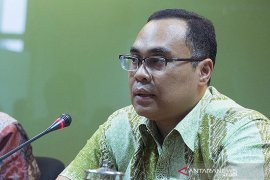"In a meeting between the leadership of Indonesia`s People`s Consultative Assembly (MPR) and former Malaysian prime minister Abdullah Badawi in Putrajaya, Badawi called for the border problems to be continuously discussed by the two countries," Hikmahanto said.
Badawi`s appeal must be welcomed by the Indonesian government because with regard to Tanjung Datu, Malaysia seems to be unwilling to discuss it with Indonesia because the two countries had already signed a memorandum of understanding on it in 1978, Hikmahanto from state University of Indonesia said.
He said there were three reasons for why Badawi`s appeal had to be responded to positively.
"Firstly, the Indonesian government must see the 1978 MOU not as a binding international law instrument," he said.
He said an MOU`s substance could not be treated as a border agreement between Indonesia and Malaysia. "Therefore under an MOU no party is bound to honor it. Even an MOU is indeed only intended for mere a technical document to determine a coordinate," he said.
Secondly, he said, an MOU could not be treated as the continuation of the 1891 Dutch-British treaty recognized by Indonesia and Malaysia.
"In law it is impossible for a treaty to be followed by an MOU. On the contrary, it is an MOU that precedes a treaty," he said.
Hikmahanto said the right way of thinking was recognizing the 1891 Dutch-British border accord as a descriptive agreement for determining the two countries` borders.
"This treaty t must be followed by a border agreement which contains the concrete coordinates of the borders between the two countries," he said.
Thirdly, the professor said, the coordinates set in the 1978 MOU in Tanjung Datu that went into Indonesia were problematic because referring to the map made unilaterally by Malaysia it even indents into Malaysia.
Hikmahanto said the Indonesian government should have found out and asked to the Malaysian government what method they had used to make the map.
The method to determine the border used by Malaysia is worth questioning because it very likley that the method to determine the coordinate used in the 1978 MOU was wrong, he said.
He said "if Malaysia has a good will it certainly will be willing to have the coordinate at Tanjung Datu reviewed and renegotiated."
Based on the three factors, he said the government must continue to fight to make Malaysia agree that Tanjung Datu is an outstanding boundary problem.
"If Malaysia would not agree the government must consider the coordinate in Tanjung Datu not conclusive and nothing has been agreed upon," he said.
(L.A017*G003/H-YH/HAJM/O001)
Editor: Priyambodo RH
Copyright © ANTARA 2011










